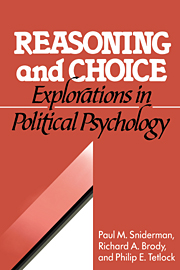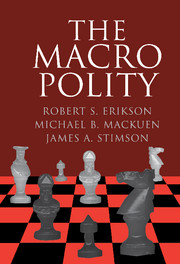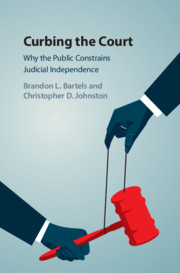Reasoning and Choice
Drawing on a multitude of data sets and building on analyses carried out over more than a decade, Reasoning and Choice offers a major new theoretical explanation of how ordinary citizens figure out what they favor and oppose politically. Reacting against the conventional wisdom, which stresses how little attention the general public pays to political issues and the lack of consistency in their political opinions, the studies presented in this book redirect attention to the processes of reasoning that can be discerned when people are confronted with choices about political issues.
These studies demonstrate that ordinary people are in fact capable of reasoning dependably about political issues by the use of judgmental heuristics, even if they have only a limited knowledge of politics and of specific issues. An important point is that both the well-educated and the less-educated use heuristics in political reasoning, but that the well-educated tend to employ different heuristics and take into account more factors in their consideration of issues.
- Winner of the American Political Science Association's 1992 Woodrow Wilson Foundation Book Award
- A major contribution to the literature on public opinion and political psychology
Reviews & endorsements
"A book of great importance that deserves widespread and careful attention. By showing that people with limited information use reasoning shortcuts to form sensible political opinions, it helps explain how inattentive and even ignorant citizens can constitute a rational public." Benjamin I. Page, Northwestern University
"The research reported here is clear, compelling, and highly relevant to a broad social science audience. The first chapter does a very nice job of outlining the underlying theme of the book and the substantive chapters are first-rate. The book is, moreover, very well written. It will make a real contribution to the growing research in political psychology." Edward Carmines, Indiana University
"...an original and stimulating book that merits careful reading and reflection by specialists in the field of political behavior." American Political Science Review
Product details
August 1991Hardback
9780521402552
324 pages
238 × 160 × 23 mm
0.56kg
43 b/w illus. 60 tables
Available
Table of Contents
- List of tables and figures
- Preface
- 1. Introduction: major themes
- 2. The role of heuristics in political reasoning: a theory sketch
- 3. Values under pressure: AIDS and civil liberties
- 4. The principle-policy puzzle: the paradox of American racial attitudes
- 5. Reasoning chains
- 6. The likability heuristic
- 7. Democratic values and mass publics
- 8. Ideological reasoning
- 9. Information and electoral choice
- 10. Stability and change in party identification: presidential to off-years
- 11. The American dilemma: the role of law as a persuasive symbol
- 12. Ideology and issue persuasibility: dynamics of racial policy attitudes
- 13. The new racism and the American ethos
- 14. Retrospect and prospect
- Notes
- Bibliography
- Index








